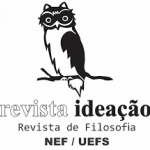A CHAPTER OF THE DEBATE BETWEEN REALISM AND ANTIREALISM IN THE BEGINNINGS OF QUANTUM MECHANICS
v. 1, n. 44 (2021) • Revista Ideação
Autor: EDUARDO SIMÕES
Abstract:
The purpose of this article is to present the debate established by realistic and anti-realist interpretations in the field of quantum mechanics. On the side of anti-realism, we chose Niels Bohr’s interpretation of complementarity given its precursor character, as well as because of the great influence it had on other orthodox interpretations of quantum mechanics. Known as Copenhagen interpretation, its anti realism is characterized, among other things, by conceiving the impossibility of the existence of entities that are not captured by the subject through measuring instruments. On the other hand, realistic interpretations conceive that such entities are real objects, whose existence is independent of the mind. Such interpretations arose in response to the anti realism of entities and were established for representing a counterpoint, as well as a rupture with the Copenhagen monocracy. We will present here as examples of this counterpoint: the EPR paradox, D. Bohm’s hidden variables, J. Bell’s inequalities and H. Everett’s relative states. In general terms, the purpose of this article is not to present the defense of a thesis, nor will we discuss in depth the arguments against the so-called Copenhagen interpretation. We will propose a presentation about the main interpretations that are contrary to the monocracy of the Copenhagen interpretation and we will deal with the developments that affected the fall of that same interpretation.
Texto Completo: http://periodicos.uefs.br/index.php/revistaideacao/article/view/7248
Palavras-Chave: Anti-realism, Copenhagen Interpretation, Realism, EPR Paradox, hidden variables, inequalities, relative states.

Revista Ideação
A Revista IDEAÇÃO, do Núcleo Interdisciplinar de Estudos e Pesquisas em Filosofia, é uma publicação semestral que, com o apoio da editora da Universidade Estadual de Feira de Santana, publica textos originais de Filosofia, ou de abordagem ou relevância filosófica, na forma de artigos, traduções, resenhas ou entrevistas. Além de seu formato impresso, a Revista também é publicada na versão on-line, permitindo o seu livre acesso imediato e gratuito.
A Revista Ideação está vinculada ao Núcleo Interdisciplinar de Estudos e Pesquisa em Filosofia (NEF)/ Departamento de Ciências Humanas e Filosofia (DCHF). Neste momento, sua avaliação Qualis (Capes) é B1.
Pela abordagem interdisciplinar, a revista visa atingir diversas áreas interessadas em abordagens filosóficas e/ou que dialogam com a Filosofia.
